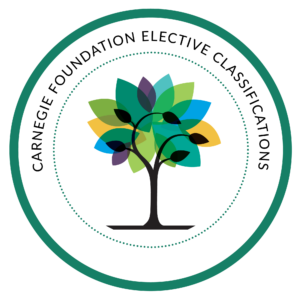What are Elective Classifications?
The Carnegie Foundation for the Advancement of Teaching sponsors Elective Classifications for those institutions that have made extraordinary commitments to their public purpose. The Elective Classifications are managed on behalf of the Carnegie Foundation by an Elective Classification Central Office.
Institutions apply to be recognized by the Carnegie Foundation through a particular Elective Classification theme and make extraordinary commitments to that theme. Elective Classifications are not awards. They are evidence-based documentation of institutional policy and practices focusing on areas such as institutional culture and mission, curricular and co-curricular programming, continuous improvement activities, and the recruitment and reward of faculty, staff, and students.
Becoming a classified institution requires the investment of substantial effort by participating institutions to provide evidence of the commitment to a special purpose, demonstrated with precision across the breadth of the institution. These Classifications are an institutional recognition given to an individual campus and as such requires that the self-study process consider and document many aspects of the institutional life of a campus. Classification is thus given to successful campuses, not programs, centers, or systems of campuses. See our Policy for Multi-Campus Institutions for additional guidance.
Achieving Excellence: Community Colleges and the Carnegie Elective Classifications
View the recording of this webinar where attendees discovered how community colleges are leveraging the Carnegie Elective Classifications to enhance their institutional impact and community engagement. This interactive event featured insights from community colleges that have successfully achieved Community Engagement or Leadership for Public Purpose Elective Classifications. Speakers shared their strategies, challenges, and successes, and how these designations can amplify an institution’s commitment to meaningful partnerships, civic engagement, and public purpose. This inspiring discussion was tailored to the unique strengths and opportunities of community colleges.
Carnegie Elective Classifications: 2024 Year in Review
View the recording of this event for more information and updates on the Carnegie Elective Classifications, including Leadership for Public Purpose, Community Engagement (U.S. and international), the development of the Carnegie Elective Classification for Sustainability, and new classifications under consideration to support higher education institutions.
The 2026 Elective Classification for Community Engagement
The Carnegie Foundation’s Elective Classification for Community Engagement is a way for Colleges and Universities in the US to gain recognition for institutionalizing community engagement. Campuses must apply for the classification, which is offered every 2 years.
The 2024 Elective Classification For Leadership For Public Purpose
The Carnegie Foundation’s Elective Classification in Leadership for Public Purpose is a way for Colleges and Universities in the US to gain recognition for institutionalizing the development of leadership abilities in all institutional stakeholders and the understanding of leadership as a public good. Campuses must apply for the classification which is offered every 2 years starting 2024.
The Carnegie Elective Classification for Sustainability
The Carnegie Elective Classification for Sustainability is an innovative initiative designed to recognize and celebrate higher education institutions that demonstrate a commitment to sustainability and climate action as integral to their academic missions.
Training and Support
In an effort to support campuses seeking the Carnegie Elective Classifications, ACE provides training and support services both virtually and in-person. The classifications team at ACE offers multi-institutional webinars, conference presentations, and workshops. For campuses that are interested in one-on-one support, contact information for Carnegie-prepared consultants is available; these consultants are independent of ACE and the Carnegie Foundation for the Advancement of Teaching. Campuses that submitted an unsuccessful application for the Elective Classification for Community Engagement in the previous cycle (2020) may request a feedback session.
Community Engagement Training and Consultants
Community Engagement Training & Consultants
The Community Engagement forum on ACE Engage is designed for resources, training, and to connect campuses who are preparing for the Carnegie Elective Classification for Community Engagement
Leadership for Public Purpose Training
Leadership For Public Purpose Training Schedule
Higherled is an online forum designed for resources, training, and to connect campuses who are preparing for the Carnegie Elective Classification in Leadership for Public Purpose. Hosted by the Doerr Institution for Emerging Leaders at Rice University.
